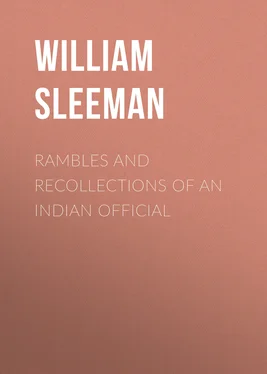William Sleeman - Rambles and Recollections of an Indian Official
Здесь есть возможность читать онлайн «William Sleeman - Rambles and Recollections of an Indian Official» — ознакомительный отрывок электронной книги совершенно бесплатно, а после прочтения отрывка купить полную версию. В некоторых случаях можно слушать аудио, скачать через торрент в формате fb2 и присутствует краткое содержание. Жанр: Путешествия и география, История, foreign_edu, foreign_antique, foreign_prose, на английском языке. Описание произведения, (предисловие) а так же отзывы посетителей доступны на портале библиотеки ЛибКат.
- Название:Rambles and Recollections of an Indian Official
- Автор:
- Жанр:
- Год:неизвестен
- ISBN:нет данных
- Рейтинг книги:4 / 5. Голосов: 1
-
Избранное:Добавить в избранное
- Отзывы:
-
Ваша оценка:
- 80
- 1
- 2
- 3
- 4
- 5
Rambles and Recollections of an Indian Official: краткое содержание, описание и аннотация
Предлагаем к чтению аннотацию, описание, краткое содержание или предисловие (зависит от того, что написал сам автор книги «Rambles and Recollections of an Indian Official»). Если вы не нашли необходимую информацию о книге — напишите в комментариях, мы постараемся отыскать её.
Rambles and Recollections of an Indian Official — читать онлайн ознакомительный отрывок
Ниже представлен текст книги, разбитый по страницам. Система сохранения места последней прочитанной страницы, позволяет с удобством читать онлайн бесплатно книгу «Rambles and Recollections of an Indian Official», без необходимости каждый раз заново искать на чём Вы остановились. Поставьте закладку, и сможете в любой момент перейти на страницу, на которой закончили чтение.
Интервал:
Закладка:
'But', said I, 'no man's field is watered from that lake.'
'No', replied he, 'but for every man that drinks of the waters of this, fifty drink of the waters of that; from that lake thirty thousand people get ārām (comfort) every day.'
This lake is called Kēwlas after Kēwal Varmma, the Chandēl prince by whom it was formed. 344His palace, now in ruins, stood on the top of the ridge of rocks in a very beautiful situation. From the summit, about eight miles to the west, we could see a still larger lake, called the Nandanvārā Lake, extending under a similar range of quartz hills running parallel with that on which we stood. 345That lake, we were told, answered upon a much larger scale the same admirable purpose of supplying water for the fields, and securing the people from the dreadful effects of droughts. The extensive level plains through which the rivers of Central India 346generally cut their way have, for the most part, been the beds of immense natural lakes; 347and there rivers sink so deep into their beds, and leave such ghastly chasms and ravines on either side, that their waters are hardly ever available in due season for irrigation. It is this characteristic of the rivers of Central India that makes such lakes so valuable to the people, particularly in seasons of drought. 348The river Nerbudda has been known to rise seventy feet in the course of a couple of days in the rains; and, during the season when its waters are wanted for irrigation, they can nowhere be found within that [distance] of the surface; while a level piece of ground fit for irrigation is rarely to be met with within a mile of the stream. 349
The people appeared to improve as we advanced farther into Bundēlkhand in appearance, manners, and intelligence. There is a bold bearing about the Bundēlas, which at first one is apt to take for rudeness or impudence, but which in time he finds not to be so.
The employés of the Rājā were everywhere attentive, frank, and polite; and the peasantry seemed no longer inferior to those of our Sāgar and Nerbudda territories. The females of almost all the villages through which we passed came out with their Kalas in procession to meet us—one of the most affecting marks of respect from the peasantry for their superiors that I know. One woman carries on her head a brass jug, brightly polished, full of water; while all the other families of the village crowd around her, and sing in chorus some rural song, that lasts from the time the respected visitor comes in sight till he disappears. He usually puts into the Kalas a rupee to purchase 'gur' (coarse sugar), of which all the females partake, as a sacred offering to the sex. No member of the other sex presumes to partake of it, and during the chorus all the men stand aloof in respectful silence. This custom prevails all over India, or over all parts of it that I have seen; and yet I have witnessed a Governor-General of India, with all his suite, passing by this interesting group, without knowing or asking what it was. I lingered behind, and quietly put my silver into the jug, as if from the Governor-General. 350
The man who administers the government over these seven villages in all its branches, civil, criminal, and fiscal, receives a salary of only two hundred rupees a year. He collects the revenues on the part of Government; and, with the assistance of the heads and the elders of the villages, adjusts all petty matters of dispute among the people, both civil and criminal. Disputes of a more serious character are sent to be adjusted at the capital by the Rājā and his ministers. The person who reigns over the seven villages of the lake is about thirty years of age, of the Rājpūt caste, and, I think, one of the finest young men I have ever seen. His ancestors have served the Orchhā State in the same station for seven generations; and he tells me that he hopes his posterity will serve them [ sic ] for as many more, provided they do not forfeit their claims to do so by their infidelity or incapacity. This young man seemed to have the respect and affection of every member of the little communities of the villages through which we passed, and it was evident that he deserved their attachment. I have rarely seen any similar signs of attachment to one of our own native officers. This arises chiefly from the circumstance of their being less frequently placed in authority among those upon whose good feelings and opinions their welfare and comfort, as those of their children, are likely permanently to depend. In India, under native rule, office became hereditary, because officers expended the whole of their incomes in religious ceremonies, or works of ornament and utility, and left their families in hopeless dependence upon the chief in whose service they had laboured all their lives, while they had been educating their sons exclusively with the view of serving that chief in the same capacity that their fathers had served him before them. It is in this case, and this alone, that the law of primogeniture is in force in India. 351Among Muhammadans, as well as Hindoos, all property, real and personal, is divided equally among the children; 352but the duties of an office will not admit of the same subdivision; and this, therefore, when hereditary, as it often is, descends to the eldest son with the obligation of providing for the rest of the family. The family consists of all the members who remain united to the parent stock, including the widows and orphans of the sons or brothers who were so up to the time of their death. 353
The old 'chobdār', or silver-stick bearer, who came with us from the Rājā, gets fifteen rupees a month, and his ancestors have served the Rājā for several generations. The Dīwān, who has charge of the treasury, receives only one thousand rupees a year, and the Bakshī, or paymaster of the army, who seems at present to rule the state as the prime favourite, the same. These latter are at present the only two great officers of state; and, though they are, no doubt, realizing handsome incomes by indirect means, they dare not make any display, lest signs of wealth might induce the Rājā or his successors to treat them as their predecessors in office were treated for some time past. 354The Jāgīrdārs, or feudal chiefs, as I have before stated, are almost all of the same family or class as the Rājā, and they spend all the revenues of their estates in the maintenance of military retainers, upon whose courage and fidelity they can generally rely. These Jāgīrdārs are bound to attend the prince on all great occasions, and at certain intervals; and are made to contribute something to his exchequer in tribute. Almost all live beyond their legitimate means, and make up the deficiency by maintaining upon their estates gangs of thieves, robbers, and murderers, who extend their depredations into the country around, and share the prey with these chiefs, and their officers and under-tenants. They keep them as poachers keep their dogs ; and the paramount power, whose subjects they plunder, might as well ask them for the best horse in the stable as for the best thief that lives under their protection. 355
I should mention an incident that occurred during the Rājā's visit to me at Tehrī. Lieutenant Thomas was sitting next to the little Sarīmant, and during the interview he asked him to allow him to look at his beautiful little gold-hilted sword. The Sarīmant held it fast, and told him that he should do himself the honour of waiting upon him in his tent in the course of the day, when he would show him the sword and tell him its history. After the Rājā, left me, Thomas mentioned this, and said he felt very much hurt at the incivility of my little friend; but I told him that he was in everything he did and said so perfectly the gentleman, that I felt quite sure he would explain all to his satisfaction when he called upon him. During his visit to Thomas he apologized for not having given over his sword to him, and said, 'You European gentlemen have such perfect confidence in each other, that you can, at all times, and in all situations, venture to gratify your curiosity in these matters, and draw your swords in a crowd just as well as when alone; but, had you drawn mine from the scabbard in such a situation, with the tent full of the Rājā's personal attendants, and surrounded by a devoted and not very orderly soldiery, it might have been attended by very serious consequences. Any man outside might have seen the blade gloaming, and, not observing distinctly why it had been drawn, might have suspected treachery, and called out " To the rescue ", when we should all have been cut down—the lady, child, and all.' Thomas was not only satisfied with the Sarīmant's apology, but was so much delighted with him, that he has ever since been longing to get his portrait; for he says it was really his intention to draw the sword had the Sarīmant given it to him. As I have said, his face is extremely beautiful, quite a model for a painter or a statuary, and his figure, though small, is handsome. He dresses with great elegance, mostly in azure-coloured satin, surmounted by a rose- coloured turban and a waistband of the same colour. All his motions are graceful, and his manners have an exquisite polish. A greater master of all the convenances I have never seen, though he is of slender capacity, and, as I have said, in stature less than five feet high.
Читать дальшеИнтервал:
Закладка:
Похожие книги на «Rambles and Recollections of an Indian Official»
Представляем Вашему вниманию похожие книги на «Rambles and Recollections of an Indian Official» списком для выбора. Мы отобрали схожую по названию и смыслу литературу в надежде предоставить читателям больше вариантов отыскать новые, интересные, ещё непрочитанные произведения.
Обсуждение, отзывы о книге «Rambles and Recollections of an Indian Official» и просто собственные мнения читателей. Оставьте ваши комментарии, напишите, что Вы думаете о произведении, его смысле или главных героях. Укажите что конкретно понравилось, а что нет, и почему Вы так считаете.












